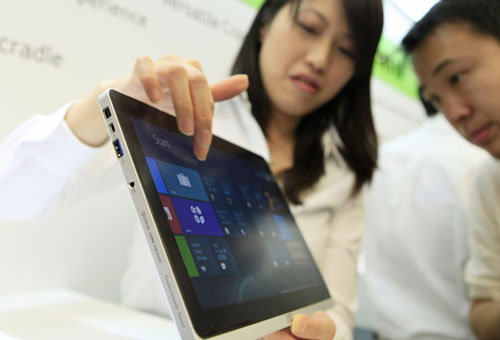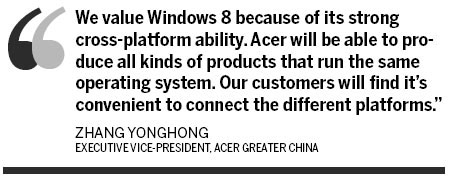Tablet, phone markets lure makers of PCs
 |
|
An attendant demonstrates how to use an Acer Inc Iconia W700 tablet device at a news conference in Taipei. Acer expects devices running Microsoft Corp's Windows 8 software to start contributing to its revenues in August as the Taiwan's largest computer maker starts shipments ahead of the official release. Ashley Pon / Bloomberg |
Slowing sales as well as good Apple and Samsung profits hurt computer producers
Taiwan personal computer maker Acer Inc is eyeing the high-end consumer market following the release of good Apple Inc and Samsung revenues. Executives said the newly issued Windows 8 could be "the last chance" to help the company back on its feet.
The rapid growth of the tablet and smartphone markets has been hitting the margins of PC makers, said Scott Lin, president of Acer Greater China.
"Although customers were spending the same amount of money on electronic products, iPads and smartphones have taken most of their budget," he said.
On Oct 22, Acer reported third-quarter net profits of NT$68 million ($2.3 million), well below analysts' estimates.
The world's largest chipmaker, Intel Corp, expected the PC business to grow at only about half the normal seasonal rate in the fourth quarter because of the passive economic outlook. Worldwide PC shipments fell more than 8 percent in the third quarter compared with a year earlier to 87.5 million, the biggest decline since 2001, said analysis company Gartner Group.
On Nov 2, Acer launched its first ultrabooks running Microsoft's Windows 8 operating system, trying to boost sales.
The touch-enabled S7 series is targeting the high-end market. The price for entry-level products is 9,999 yuan ($1,600).
The company is largely relying on its 1,600 brick-and-mortar stores in major cities across the nation to sell the S7 but it will also team up with online retailers to try to accelerate sales.
"We will cooperate with e-commerce websites but not implement a price war," said Zhang Yonghong, executive vice-president of Acer Greater China.
Acer hopes that by the end of next year it will have about 30 percent of the global ultrabook market, which features touchable screens and the Windows 8 system.
The company did not put an estimate on its market share on the Chinese mainland, but said it could easily sell 10,000 units of S7 a day.
"I am sure that Acer will be back on track by next year, meaning we will report a better revenue result," said Lin.
"We value Windows 8 because of its strong cross-platform ability," said Zhang. "Acer will be able to produce all kinds of products that run the same operating system. Our customers will find it's convenient to connect the different platforms."
However, hardware markers such as Acer are unhappy that Microsoft is rolling out Surface, a self-developed tablet running Windows 8.
"It requires a lot effort for a software company to introduce hardware products," said Lin. "But in the long run, Surface is set to lift Windows' presence in the tablet market, which is good news for Acer.
Greater pressure comes from other hardware manufacturers.
Another Taiwan-based company, ASUSTeK Computer Inc, also launched touch-enabled Windows 8 laptops. Selling at less than 4,000 yuan, the product is believed to be a strong competitor to Acer's Windows 8 series.
"I am not worried about Asus' new gadget. It mainly targets lower-end buyers," said Lin, adding that many companies are introducing touch-screen laptops but only a few have created quality user experience.
"It depends on the corporations' strategies. We are starting with the high-end market," he added.
In addition, Acer said it will continue to look for other mobile devices, such as smartphones, for more revenues.
On Sept 13, Acer announced the cancellation of the launch of its smartphones running a cloud-based operating system developed by a division of Alibaba Group because of "direct pressure" from Google Inc, the developer of the Android system.
Although, Acer reiterated that it will continue its cooperation with Alibaba, no further moves were taken after the incident.
"Acer was a victim of Google and Alibaba's war," said Liu Peng, an analyst at Beijing-based research company Analysys International.
Acer was forced to enter the smartphone market because the growth in the PC market is slowing but there is fierce competition, according to Liu.
The company has not given up on its plans for a smartphone business but it will be very cautious in the area, according to Zhang from Acer Greater China. "We will not add research and development investment in this area," he said.
Acer plans to roll out six smartphones - most running the Android system - by the end of 2013.
gaoyuan@chinadaily.com.cn

















